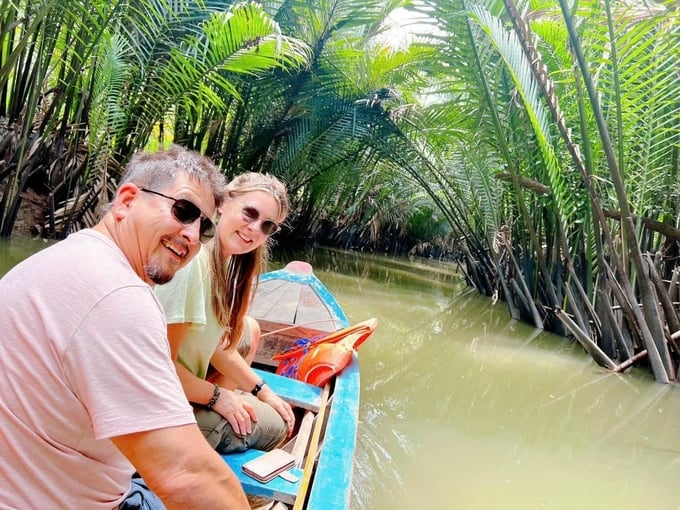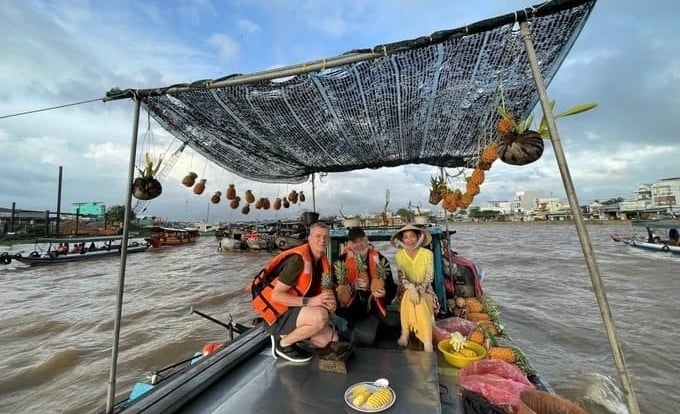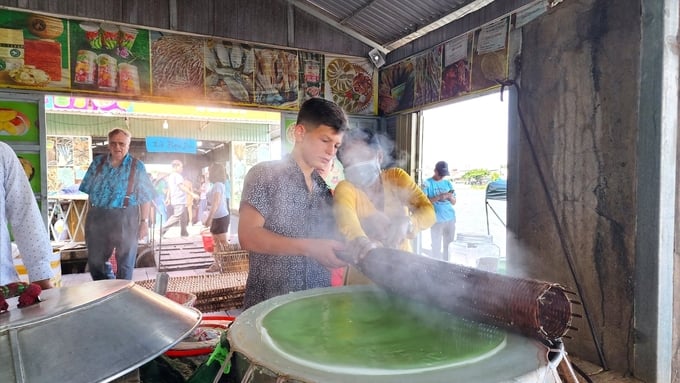June 21, 2025 | 03:42 GMT +7
June 21, 2025 | 03:42 GMT +7
Hotline: 0913.378.918
June 21, 2025 | 03:42 GMT +7
Hotline: 0913.378.918

International tourists enjoy experiencing the agricultural tourism model in the Mekong Delta. Photo: Kim Anh.
Agricultural tourism is a worldwide trend that offers city dwellers a chance to escape urban concrete and re-discover their rural roots. In addition, visiting farmers, agronomists and other agricultural experts can evaluate worldwide agricultural developments, which have been greatly influenced by modern technology.
Agricultural tourism and community tourism are forms that are developing strongly in rural areas of the Mekong Delta. Fruit orchards, shrimp squares, cajuput forests, or fish raft houses... become meeting points for tourists, especially foreigners.
About 10km from the center of Can Tho city, people living in Con Son, Binh Thuy district exploit the strengths of fruit gardens, aquaculture, and association in community tourism. Through surveying needs and the ability to build models, nine gardeners "joined hands" to develop tourism services.
Gardeners are consulted, designed, and given technical training to care for and develop the garden and ensure the trees bear fruit all year round to diversify products to serve tourists. In addition, the Can Tho City Farmers' Association has supported aquatic breeds for people to raise in garden ditches, increasing income and enriching the model. Thanks to that, the number of households participating in community tourism in Con Son has risen to 25 households.
On average, every day, Con Son welcomes about 250 tourists; along with tourism development, other services such as transportation, cuisine, and tour guides also create jobs and stable income for people.
The tourism development model on the Cai Rang floating market also creates a unique cultural feature of the West and Can Tho City. This place attracts hundreds of thousands of visitors every year.

The tourism development model on the Cai Rang floating market is a unique cultural feature of Can Tho City, attracting hundreds of thousands of tourists each year. Photo: Kim Anh.
According to statistics from the Farmers' Association of Can Tho City, there are currently about 75 households developing garden eco-tourism, over 35 tourist areas and attractions, and 2 community tourism destinations, concentrated in Phong Dien district, Cai Rang, Binh Thuy, and O Mon districts. With 3 main types of agricultural tourism for day visitors, stays and small resorts.
However, developing agricultural tourism in Can Tho City is difficult because the transport infrastructure is not synchronous. Some attractions must be reached by boat or motorbike. Furthermore, many garden locations have similar methods and have not yet created specialized receiving points. In particular, people's demand to expand tourism development space is not high.
Mekong Delta Co.op Company Limited - a young travel agency, chooses the region's agricultural and ecological strengths to build tourist routes exclusively for international visitors. Mrs. Cao Thien Ly, Business Director of Mekong Delta Co.op, said the potential for developing agricultural tourism there is enormous. The organization welcomes 180 - 200 international visitors to the Mekong Delta monthly.
“International visitors find rustic, simple, and close things when returning to the delta. Especially, they get to interact with local people and enjoy the food and stories about their lives," Mrs. Ly expressed.

The trend of tourists returning to agricultural tourism is to feel the rustic, close things, and interact with local people. Photo: Kim Anh.
For agricultural tourism in the Mekong Delta to develop more systematically, Mrs. Ly believes it is necessary to train and support farmers to have a consistent time and way to welcome visitors regularly. Otherwise, it will become a limitation for the industry. People do not need to be too professional. The important thing is to be cheerful, warm, enthusiastic, and not stereotyped. Those are the expectations of Mekong Delta Co.op to develop agricultural tourism in the coming time.
Agricultural tourism has become a necessary means for many small farms’ survival. By diversifying business operations, farm operators are able to ensure a more stable income. This is because agritourism activities can occur during times of the year when crops may not be in season, and by providing a completely separate stream of income. Some studies have found that agritourism operations often benefit their surrounding communities by drawing tourists to the area. The economic boost from the increase in traffic can benefit rural areas in need of diversified income streams.
The country currently operates about 500 agricultural and rural tourism models, stretching from the Northern mountainous region to the Central Highlands, Southeast, and the Mekong Delta...
The fields of agriculture, forestry, fisheries, and traditional industries have added value, becoming local specialties and OCOP products, thanks to tourism. Indigenous knowledge, culture, folk cuisine, traditional rituals... are awakened.
Translated by Tuan Huy
/2025/06/17/3942-2-143243_548.jpg)
(VAN) Recently, in Sweden, the Secretary of the Binh Dinh Provincial Party Committee presented the Investment Registration Certificate for the 'Polyester Fabric Recycling Complex' project to SYRE Impact-AB Company.
/2025/06/12/3721-2-202745_83.jpg)
(VAN) TH made an impression at Seoul Food 2025 with its line of natural beverages, paving the way for Vietnamese food products to enter the South Korean market.

(VAN) Soc Trang's success in rice exports stems from a strategy of developing fragrant and specialty rice cultivation areas and standardizing production toward low-emission practices.
/2025/06/11/1311-5-120811_839.jpg)
(VAN) The pig farming industry is facing the challenge of comprehensive restructuring to meet requirements for quality, safety, traceability, and market expansion both domestically and for export.

(VAN) Vietnam considers participating in ALGROALBA in order to expand agricultural production, coordinate the assessment and effective exploitation potential land.
/2025/06/05/5314-1-184727_407.jpg)
(VAN) From seemingly worthless fish scales and skin, enzymes and lactic ferments can transform by-products into peptides, opening a sustainable, effective business direction and elevating Vietnamese seafood.

(VAN) TTC AgriS and IFC signed a strategic partnership to develop a sustainable agricultural value chain, aiming to achieve the Net Zero target by 2035.